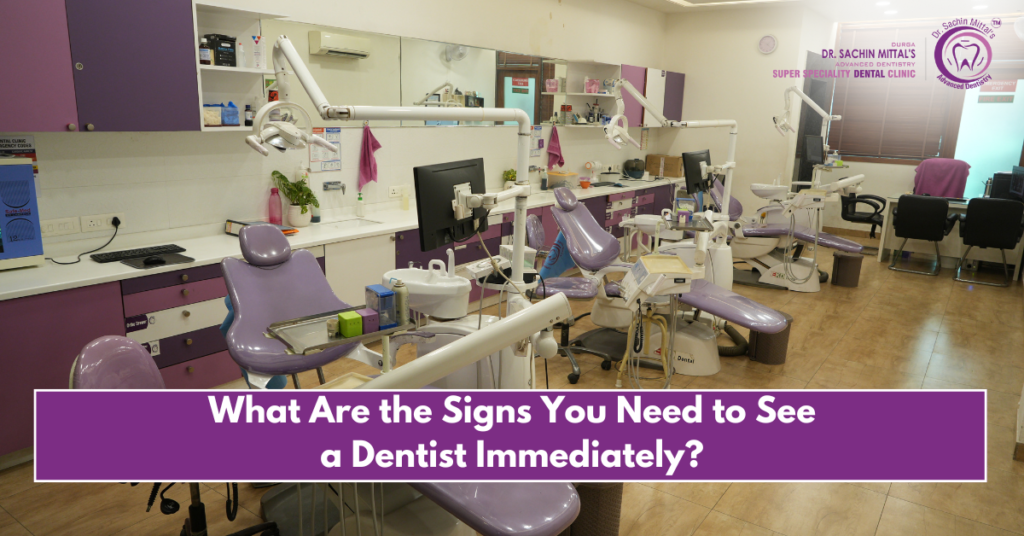Taking care of your oral health is crucial for your overall well-being. Regular dental check-ups help prevent many dental issues, but sometimes, dental problems can arise unexpectedly and require immediate attention. Ignoring these signs could lead to severe complications, including infections or permanent damage.
Here are some warning signs that indicate you need to see a dentist immediately:
1. Intense Toothache: When Pain Becomes Unbearable
Persistent and severe tooth pain is one of the clearest signs that you need to see a dentist right away. While mild discomfort or occasional sensitivity may not be concerning, intense and constant tooth pain can be a symptom of:
- Tooth Decay: If a cavity progresses deep into the tooth, it can cause significant pain.
- Abscessed Tooth: A bacterial infection in the tooth root can lead to severe pain and swelling.
- Cracked or Fractured Tooth: A broken tooth can result in sharp pain, especially when chewing or exposed to hot or cold temperatures.
If your tooth pain is disrupting your daily routine, don’t delay. Seeking professional help early can prevent the condition from worsening.
2. Gum Bleeding: A Sign of Potential Gum Disease
Occasional light bleeding while brushing may be due to aggressive brushing, but consistent gum bleeding is often a warning sign of gum disease. This condition can cause:
- Swollen or Red Gums: Often the first indication of gum inflammation caused by plaque buildup.
- Receding Gums: If your gums are pulling away from your teeth, it could expose the roots and lead to further problems.
- Persistent Bad Breath: Bacteria in infected gums can lead to chronic bad breath.
Don’t ignore bleeding gums. Gum disease, if left untreated, can lead to more serious issues like tooth loss.

3. Loose or Shifting Teeth: A Dental Emergency
If you notice your teeth becoming loose or shifting in position, this is a serious red flag that demands immediate attention. Adult teeth should remain firmly in place, so movement or looseness might indicate:
- Advanced Gum Disease: When gum disease is left untreated, it can erode the bone that supports your teeth.
- Injury or Trauma: A blow to the face can cause teeth to become loose or dislodged.
- Teeth Grinding (Bruxism): Clenching or grinding your teeth can wear down and loosen them over time.
Visit a dentist as soon as possible if you notice any loose teeth. Addressing the problem early can prevent further damage.
4. Persistent Bad Breath: Could Be More Than Just Hygiene
Chronic bad breath, even after brushing or using mouthwash, can signal a more serious issue. Persistent bad breath may be caused by:
- Gum Disease: Bacteria build-up in infected gums can lead to bad breath that won’t go away.
- Dry Mouth: Reduced saliva production leads to a dry mouth, creating a breeding ground for bacteria.
- Tooth Infections: Abscesses or severe decay can result in bad odors coming from the mouth.
If your breath continues to smell bad despite good oral hygiene, it’s time to schedule a dental checkup to identify the root cause.
5. Facial or Jaw Swelling: Sign of Infection
Swelling in the face or jaw is a strong indication that you may have an underlying infection. Possible causes include:
- Dental Abscess: A serious infection at the root of a tooth that causes pain and swelling in the jaw or face.
- Salivary Gland Blockage: When the salivary glands become blocked or infected, it can cause swelling and discomfort.
- Cysts or Tumors: While less common, swelling in the jaw could indicate a cyst or tumor, which should be examined immediately.
If you experience any swelling, seek dental care without delay to avoid further complications, such as the spread of infection.
6. Jaw Pain or Clicking: Could Be TMJ Disorder
If you experience frequent pain in your jaw or hear a clicking or popping sound when you chew, it may indicate temporomandibular joint (TMJ) disorder. Common causes include:
- Teeth Grinding (Bruxism): Chronic grinding can stress the jaw joint, leading to pain.
- Misaligned Bite: An uneven bite can cause stress on the jaw, resulting in discomfort or pain.
- Jaw Injury: Trauma to the jaw can damage the joint, causing long-term pain or difficulty in movement.
Don’t ignore jaw pain or clicking, as untreated TMJ problems can lead to chronic discomfort and damage. A dentist can provide solutions to ease the pain and correct the issue.

7. Unusual White or Red Patches in the Mouth: Possible Warning of Oral Cancer
If you notice white or red patches in your mouth that don’t heal within a week, it’s important to have them checked by a dentist. These patches could indicate:
- Oral Thrush: A fungal infection causing white patches, especially in people with weakened immune systems.
- Leukoplakia: A condition causing thick white patches, often a result of smoking or irritation.
- Oral Cancer: Red or white patches, sores, or lumps in the mouth that don’t heal could be early signs of oral cancer.
Early detection of oral cancer or other conditions can significantly improve treatment outcomes, so don’t hesitate to visit a dentist for a full evaluation.
If you’re experiencing any of these 9 signs, it’s important to visit a dentist as soon as possible. Ignoring these issues could lead to bigger problems, including pain, infections, or even tooth loss.
At Dr. Sachin Mittal Advanced Dentistry, we’re here to help. Whether you have a dental emergency or need regular care, our experienced team will make sure you get the best treatment. Don’t wait until it’s too late schedule your appointment today and keep your smile healthy!

